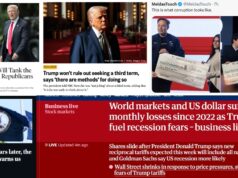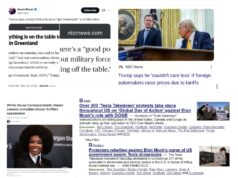
But, No, the problem, says Greenberg, is that voters have simply “tuned out” the Democrats: “they just don’t trust the Democrats to carry out those promises” and policies, they are cynical about Democratic politicians. In his focus groups and in-depth polling he heard over and over phrases like “it’s just words,” or “we don’t have a representative government anymore,” and “there’s just such a control of government by the wealthy that whatever happens, it’s not working for all the people; it’s working for a few of the people.” Hmm, maybe these voters are paying attention, after all. On the other hand, wouldn’t this apply to both political parties, not just the Democrats?
It doesn’t work that way, according to Greenberg. Voters “feel ever more estranged from government,” and they associate Democrats with government. That’s a result of Republicans’ successfully defining and branding the Democrats, I thought, and the Democrats let ’em.
Just 25 percent of the country is optimistic about our system of government, the lowest number since 1974, when polls began asking this question. Government is seen as operating by the wrong values; Wall Street lobbyists govern, not Main Street. The people believe the game is rigged, “they do not think their voices matter,” and nothing can be changed through standard democratic politics. We are now in a
“…full-blown crisis of legitimacy…. a crisis of government legitimacy is a crisis of liberalism. It doesn’t hurt Republicans. If government is seen as useless, what is the point of electing Democrats who aim to use government to advance some public end?”
At first, he mentions neither the Tea Party nor the debt ceiling crisis directly, but he dates the growth of “self-identified conservatives” from the fall of 2008 with the Wall Street bailout, when the political elite and both political parties rushed to rescue “irresponsible executives who bankrupted their own companies,” but left the average American or small businessman to suffer on their own. With Obama’s bailout of the automobile companies “voters concluded he was part of the operating elite consensus,” i.e., not a change artist after all. Everything that has happened since 2008 just confirms the perception that government is an utterly corrupted “nexus of money and power,” and nothing has really changed under Obama.
You will notice that Greenberg’s analysis provides no discussion of either how we arrived at the mess that greeted Obama immediately after his election, which pretty much boxed him in, forcing him to rely on the Washington-Wall Street elite for help (which, to be truthful, he did seem very eager to do), or any description of the heavy agitprop for over 40 years by ultra-conservative corporations and libertarians against government of any kind, which, like any good advertising campaign, finally changed public perceptions. What Greenberg does is simply paint a snapshot of where we are at this moment, and ask “What should Democrats do?”
He advises Democrats to “detoxify” politics by:
* establishing public financing of campaigns, including forcing broadcast and cable networks to provide free time candidate ads, which also means
* limiting or barring individual and corporate campaign contributions (expect a fight with the Supreme Court)
* becoming the strongest advocates for real transparency in campaign donations and in lobbying by
* taxing lobbyist expenses and excessive executive bonuses and
* putting a “small” fee on the sale of stocks, bonds, and “other financial instruments,” plus
* simplifying the tax code to allow only a few deductions, and removing those infamous special interest loopholes-(reforming the tax code is high on citizens’ list of reforms); and do not overlook
* advocating policies to control our borders and address problems of undocumented workers, thus protecting the labor market while promoting integration beginning with language and schooling—- comprehensive immigration reform; and, finally
* being serious about reducing our long-term deficits, and about making government accountable to the ordinary citizen.
The point of taking on this list is for Democrats to “show they are committed to changing the rules of the game. There is overwhelming evidence that the economy is not working for the middle class, and the standard center-left mantra of more education is simply not increasing workers’ incomes.
“Voters respond strongly to Democratic messages on the economy only when a party leader declares, ‘We have to start by changing Washington…. The middle class won’t catch a break until we confront the power of money and the lobbyists.”
Democrats have to change the public perception of government by showing that it “operates by the right values,” thus reversing the 40+ years’ worth of right-wing propaganda.
That’s a tall order, in my opinion, but we must restore the legitimacy of government by insisting on real change. The public perception of an increasingly remote government that serves and protects the elite is accurate, as is the belief that “politicians and chief executives are ‘piggybacking off each other.'”
Don’t look for help from the mass media, either. A survey in 2005 by Commondreams, still pretty accurate today, showed that
“only 118 people comprise the membership on the boards of directors of the ten big media giants… (and) these 118 individuals in turn sit on the corporate boards of 288 national and international corporations. In fact, eight out of ten big media giants share common memberships on boards of directors with each other.”
The report gave some samples of such interlocking directorates:
* New York Times: Carlyle Croup, Eli Lilly, Ford, Johnson and Johnson, Hallmark, Lehman Brothers, Staples, Pepsi
* Washington Post: Lockheed Martin, Coca-Cola, Dun and Bradstreet, Gillette, G.E. Investments, J.P Morgan, Moody’s
* Disney (ABC): Boeing, Northwest Airlines, Clorox, Estee Lauder, FedEx, Gillette, Halliburton, Kmart, McKesson, Staples, Yahoo
* GE (NBC): Anheuser-Busch, Avon, Bechtel, Chevron/Texaco, Coca-Cola, Dell, GM, Home Depot, Kellogg, J.P. Morgan, Microsoft, Motorola, Proctor and Gamble
There have been some changes, of course, in companies since 2005, but the interlocking memberships remain similar. Right here we can see why real change in how our political system operates is so hard to achieve—- yet it is exactly why we have to do it.
When the first rumblings of populist anger began, I thought it was made to order to be a Democratic movement. Oddly, the Democratic leadership ignored it, and the conservatives and corporotists co-opted the anger with the government and turned it into the Tea Party. Says Greenberg: “Perhaps now, with the debacle in Washington, liberals will become instinctively angry with this illegitimate government and build their politics from there.”



 Sign up for the Blue Virginia weekly newsletter
Sign up for the Blue Virginia weekly newsletter








![Video: UVA Prof. Larry Sabato Says We “Need to Take [Trump] Seriously” Regarding His Threat to Seek a Third Term](https://bluevirginia.us/wp-content/uploads/2025/03/sabatocnn1-100x75.jpg)